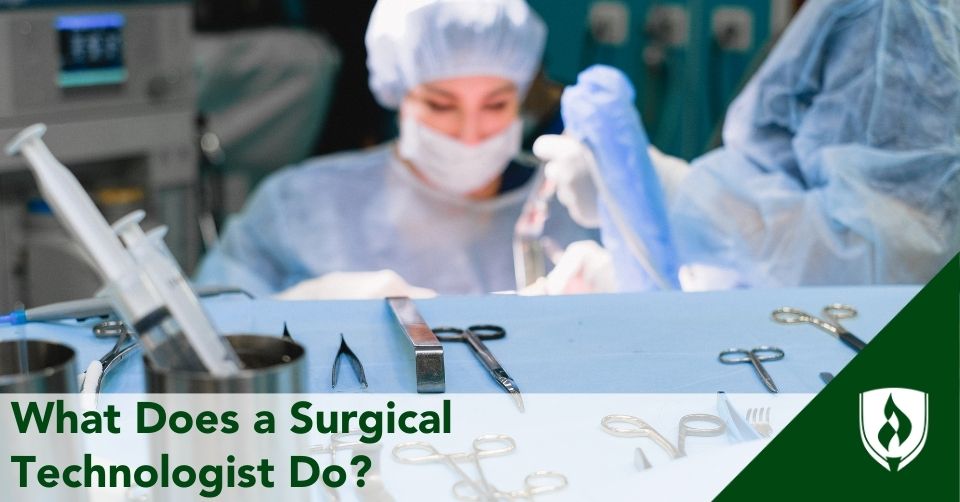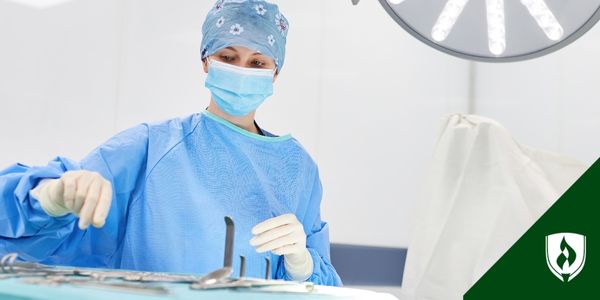What Does a Surgical Technologist Do?
10/07/2025

If you’re considering a hands-on role in health care that doesn’t require years of medical school, you might consider looking into surgical technology. Also known as surgical techs or operating room technicians, surgical technologists are important members of the health care team, and are typically responsible for ensuring that surgical procedures run smoothly, safely, and efficiently.
Their work impacts every stage of an operation, from setting up the operating room to handing instruments during surgery and helping with post-operative tasks. It’s a role that blends medical technology, attention to detail, and a strong commitment to patient care.
The Basics of Being a Surgical Technologist
Surgical technologists prepare operating rooms and arrange equipment1,ensuring that all surgical instruments are sterilized, functional, and ready for use. They also assist with patient preparation, help position the surgical patient, and apply sterile drapes over the surgical sites.
Once surgery begins, surgical technologists assist by maintaining a sterile field2, anticipating the needs of the surgeon, and passing surgical instruments with precision. They are trained in aseptic techniques, infection control, and basic life support, which helps maintain patient safety and supports quality patient care throughout the procedure.
After surgery, techs may help dress wounds, clean the room, and count instruments to ensure nothing was left behind.
Surgical Technologist Education Options
To become a surgical technologist, students typically complete a surgical technology program3, which is offered through universities like Rasmussen University’s associate degree program.4 These programs are designed to deliver both classroom instruction and hands-on training through clinical rotations in real surgical settings.
Coursework usually covers:
- Medical terminology
- Human anatomy and physiology
- Pathophysiology
- Fundamentals of surgical technology
- Surgical pharmacology
- Surgical microbiology
- Computer applications and business systems concepts
- Structure and function of the human body
Most reputable programs are accredited programs, often recognized3 by the Commission on Accreditation of Allied Health Education Programs (CAAHEP). Depending on the institution, students may earn a certificate, an applied science degree, or an associate degree.
Certification and Earning the Certified Surgical Technologist (CST) Credential
Although not always required, certifications3 like the Certified Surgical Technologist (CST) credential may be beneficial. Becoming a certified surgical technologist CST can demonstrate a deeper understanding of surgical technology and a commitment to the field.
Graduates of accredited programs may pursue certification5 by taking exams offered by the National Board of Surgical Technology and Surgical Assisting (NBSTSA), also known as the national board of surgical technology. These exams test knowledge in core areas like technology and surgical assisting, patient care, sterilization, and surgical procedures.
Maintaining certification6 also involves meeting continuing education requirements, which helps surgical techs stay current with developments in medical technology and surgical standards.
Surgical Technologists at Work
In the operating room, surgical techs work under the supervision of surgeons, registered nurses, and anesthesiologists. They help prepare2 operating rooms, organize surgical tools, and support the surgeon throughout the procedure.
Here are a few examples of their responsibilities:
- Transport and help position surgical patients
- Set up and test surgical equipment
- Apply sterile drapes and prepare incision sites
- Pass surgical instruments during surgery
- Monitor and maintain the sterile field
- Assist with wound dressing and instrument counts post-surgery
They must be4 highly organized, and able to work well under pressure. Whether they’re working7 in large hospitals, outpatient care centers, or smaller clinics, surgical technologists contribute directly to safe, effective surgical care.
Exploring Specializations in Surgical Technology
Some surgical technologists choose to focus on specific areas of medicine, such as:2
- Cardiovascular surgery
- Neurosurgery
- Orthopedic surgery
- Pediatrics
- Obstetrics and gynecology
Specializing allows8 surgical techs to develop deeper expertise in certain procedures and work with dedicated surgical teams. It can also help individuals identify areas they’re especially passionate about, whether that’s trauma care, robotic-assisted surgeries, or minimally invasive techniques.
In addition to specializations, surgical technologists may also pursue3 further education and training to become surgical assistants, educators, or even transition into nursing or other allied health careers.
Is Surgical Technology Right for You?
Those exploring a career in surgical technology often find that certain personal traits align well with the day-to-day demands of the role. For example:3
- Clear communication is essential when working alongside the surgical team, especially when sharing important updates during procedures.
- Attention to detail helps ensure that the right tools and supplies are provided when needed and that safety protocols are followed precisely.
- Comfort working with your hands is helpful, as surgical techs handle instruments and equipment quickly and accurately.
- A strong sense of ethics supports the trust placed in surgical technologists to maintain patient safety and confidentiality.
- Active listening is key when responding to instructions from surgeons or other team members in the operating room.
- Physical stamina may be beneficial, since surgical techs often stand for long periods during procedures.
- The ability to stay calm under pressure can be helpful in the fast-paced and focused environment of surgical care.
If these qualities feel familiar, exploring a surgical technology program might be a meaningful way to combine your interests and strengths with a supportive role in healthcare.
Next Steps to Become a Surgical Technologist
If you’re considering this path, the next step is to look into programs from schools that offer accredited surgical technology programs. Make sure to review the curriculum, check for accreditation, and ask about support for preparing for certification examinations.
Enrolling in a strong surgical technology education program that includes clinical training, up-to-date labs, and experienced faculty may help you build the skills needed to pursue opportunities in surgical technology.
Surgical technologists play an essential role in supporting surgeons, maintaining safety, and ensuring the smooth operation of surgical environments. With opportunities to specialize, grow, and contribute to patient outcomes every day, surgical technology is a field worth exploring for those who are ready to combine technical knowledge with compassionate care.
Want to learn how surgical technologists compare to other roles in the operating room? Explore "What is the Difference Between Surgical Technologist and Surgical Assistant" to find out which career path might be the right fit for you.
1U.S. Bureau of Labor Statistics, “Surgical Technologists,” Occupational Outlook Handbook, https://www.bls.gov/ooh/healthcare/surgical‑technologists.htm#tab‑2 (accessed August 8, 2025). Employment conditions in your area may vary.
2Association of Surgical Technologists, “Job Description: Surgical Technologist,” https://www.ast.org/uploadedfiles/main_site/content/about_us/surgical_technologist_job_description.pdf (accessed August 8, 2025).
3U.S. Bureau of Labor Statistics, “Surgical Technologists: Job Outlook,” Occupational Outlook Handbook, https://www.bls.gov/ooh/healthcare/surgical‑technologists.htm#tab‑4 (accessed August 8, 2025). Employment conditions in your area may vary.
4Rasmussen University, “Surgical Technologist Program,” https://www.rasmussen.edu/degrees/health-sciences/surgical-technologist/ (accessed August 8, 2025).
5National Board of Surgical Technology and Surgical Assisting, “CST Certification,” https://www.nbstsa.org/cst-certification (accessed August 8, 2025).
6National Board of Surgical Technology and Surgical Assisting, “Renewals & Recertification, ” https://www.nbstsa.org/renewals-recertification (accessed August 8, 2025).
7U.S. Bureau of Labor Statistics, “Surgical Technologists: Work Environment,” Occupational Outlook Handbook, https://www.bls.gov/ooh/healthcare/surgical‑technologists.htm#tab‑3 (accessed August 8, 2025). Employment conditions in your area may vary.
8Hartt, Noelle. Rasmussen University, “Is Surgical Tech a Good Career? Pros and Cons You Need to Know,” https://www.rasmussen.edu/degrees/health-sciences/blog/is-surgical-tech-a-good-career-pros-and-cons/ (accessed August 8, 2025).



